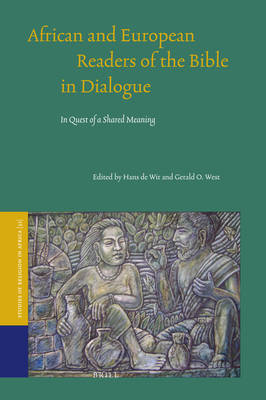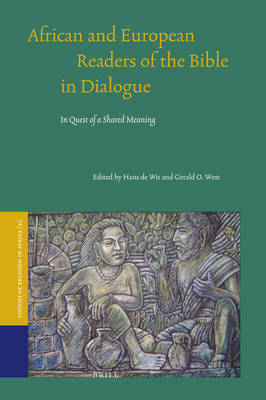
- Afhalen na 1 uur in een winkel met voorraad
- Gratis thuislevering in België vanaf € 30
- Ruim aanbod met 7 miljoen producten
- Afhalen na 1 uur in een winkel met voorraad
- Gratis thuislevering in België vanaf € 30
- Ruim aanbod met 7 miljoen producten
Zoeken
African and European Readers of the Bible in Dialogue
In Quest of a Shared Meaning
Gerald West, de Wit
€ 224,45
+ 448 punten
Omschrijving
Far too long, the relationship between European and African biblical scholarship has been a non-relationship. Divergent insights into how biblical texts should be interpreted and made fruitful for the current context, cultural differences, colonial past and post-colonial future, radically different social situations - this all made companionship and real interaction difficult. This rich and multilayered volume (result of a Stellenbosch conference 2006) attempts to disclose new modes of dialogue between readers of the Bible from those two worlds.
More than twenty theologians from Africa and Europe reflect together on how readers from radically different contexts - professional and ordinary alike -, may become allies in an ethically accountable way of relating the biblical text to their current (global) situations and how a process of mutual learning may be established.
This book provides important insights in intercultural hermeneutics, the relationship between classical historico-literary approaches and new forms of interpretation. It also gives examples of new forms of how to read the Bible in the secularised European context and the HIV/Aids stricken Africa. Particularly enriching is that every contribution is followed by a personal letter of response of another contributor to the book, giving impulses for further dialogue and debate.
The book is useful for all biblical scholars and students, in particular for those interested in how to do contextual exegesis in a manner that also takes into account the context of the other.
More than twenty theologians from Africa and Europe reflect together on how readers from radically different contexts - professional and ordinary alike -, may become allies in an ethically accountable way of relating the biblical text to their current (global) situations and how a process of mutual learning may be established.
This book provides important insights in intercultural hermeneutics, the relationship between classical historico-literary approaches and new forms of interpretation. It also gives examples of new forms of how to read the Bible in the secularised European context and the HIV/Aids stricken Africa. Particularly enriching is that every contribution is followed by a personal letter of response of another contributor to the book, giving impulses for further dialogue and debate.
The book is useful for all biblical scholars and students, in particular for those interested in how to do contextual exegesis in a manner that also takes into account the context of the other.
Specificaties
Betrokkenen
- Auteur(s):
- Uitgeverij:
Inhoud
- Aantal bladzijden:
- 433
- Taal:
- Engels
- Reeks:
- Reeksnummer:
- nr. 32
Eigenschappen
- Productcode (EAN):
- 9789004166561
- Verschijningsdatum:
- 25/06/2008
- Uitvoering:
- Hardcover
- Formaat:
- Genaaid
- Afmetingen:
- 165 mm x 241 mm
- Gewicht:
- 861 g

Alleen bij Standaard Boekhandel
+ 448 punten op je klantenkaart van Standaard Boekhandel
Beoordelingen
We publiceren alleen reviews die voldoen aan de voorwaarden voor reviews. Bekijk onze voorwaarden voor reviews.








